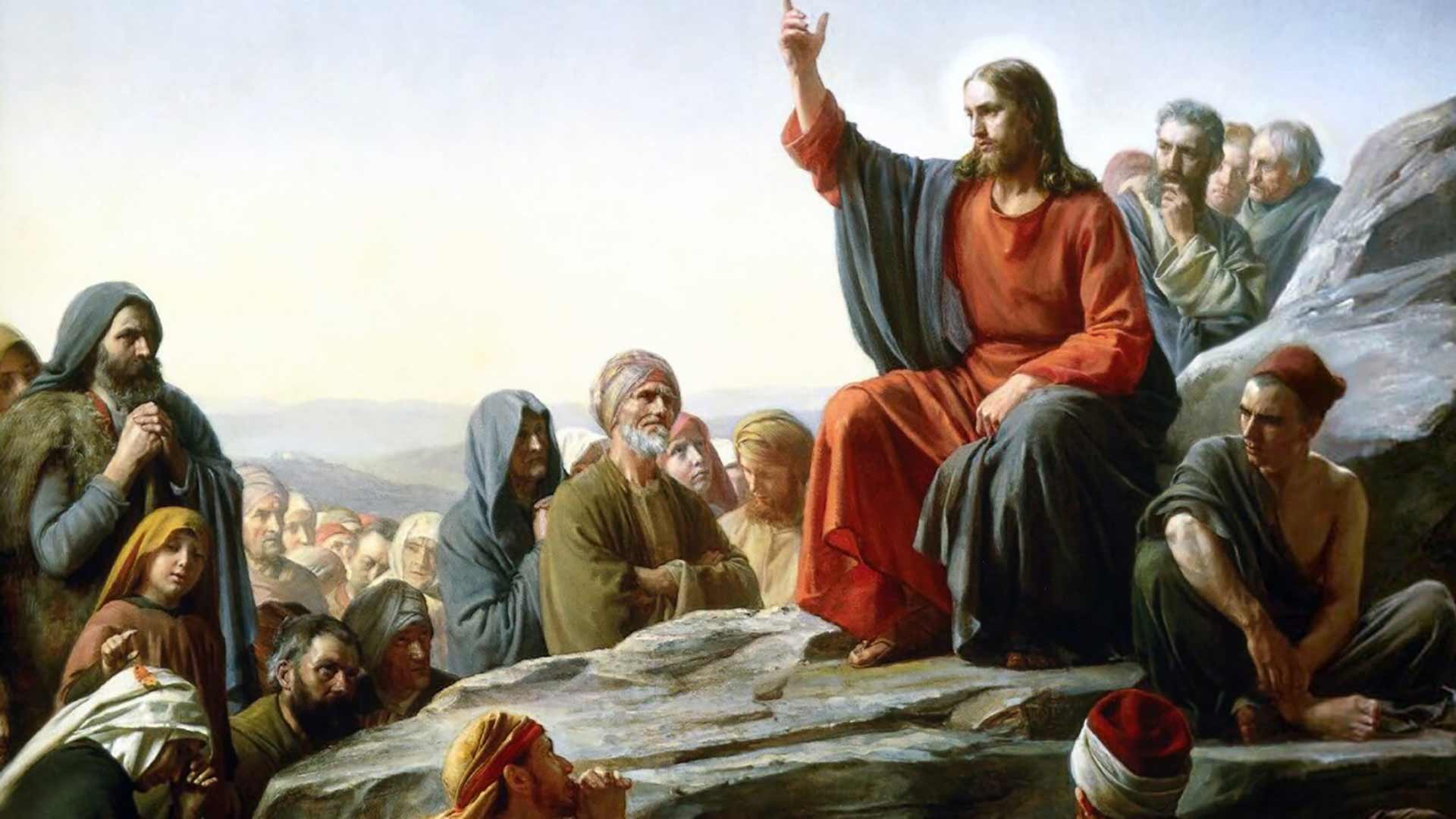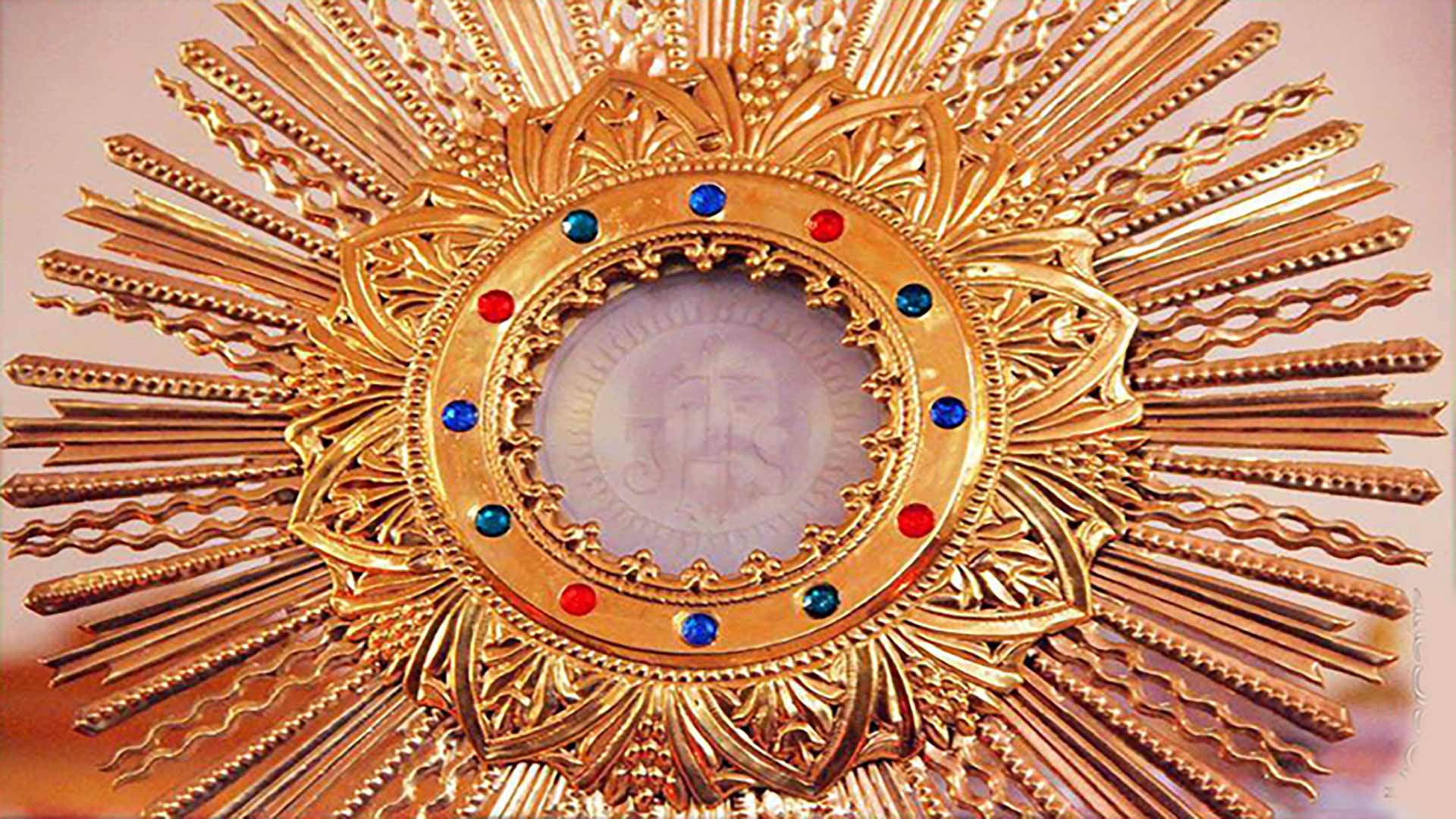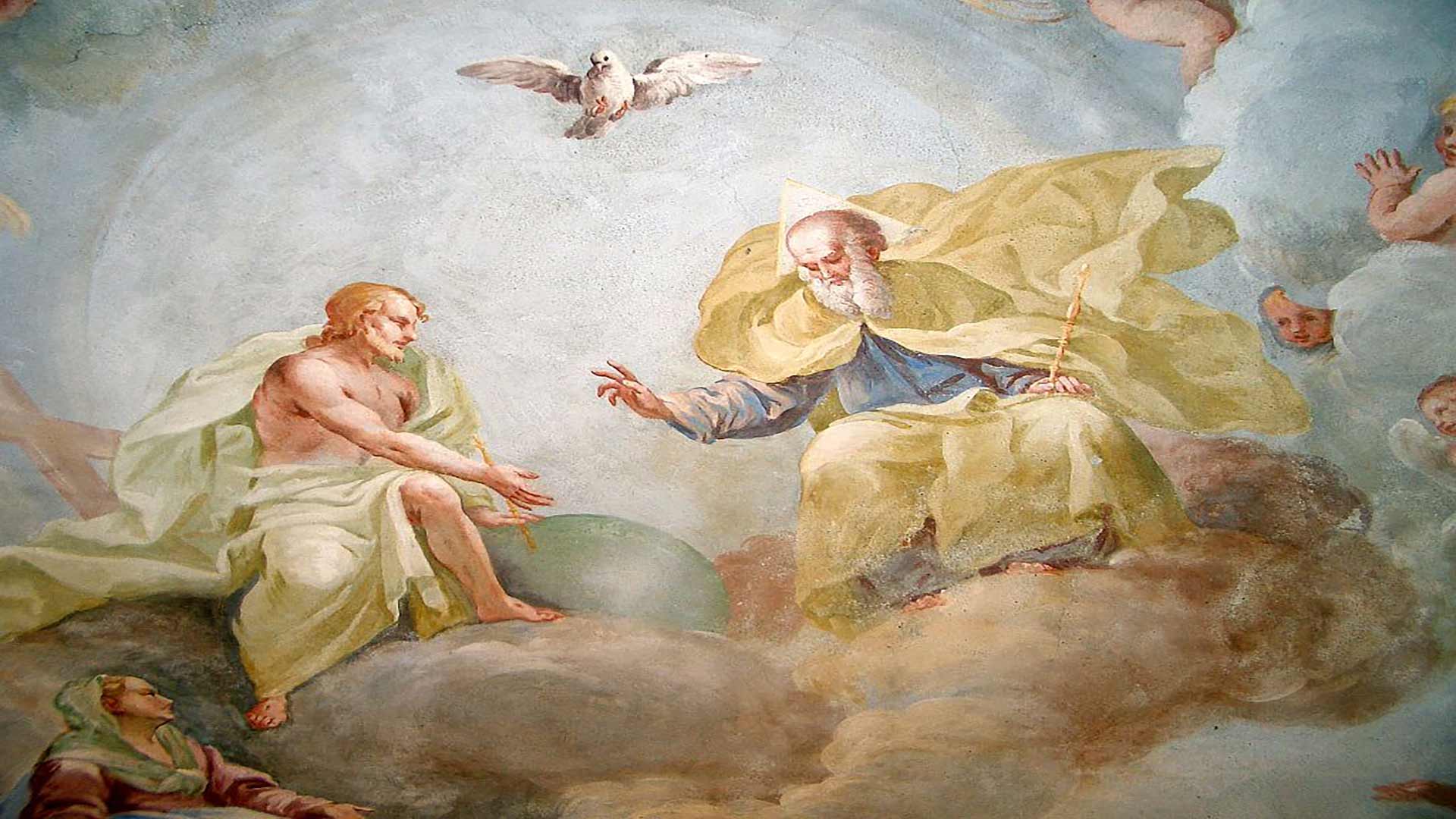Discernir o Profeta
July 7, 2024Reflexão dominical
Por que é que Jesus, no Evangelho de hoje (Mc 6, 1-6), diz: "Um profeta só é desprezado na sua terra, entre os parentes e em sua casa"?
Depois de ter deixado a casa de Jairo (ver o Evangelho do domingo passado), Jesus empreendeu uma missão pela Galileia, pregando em todas as pequenas aldeias daquela terra. Foi para a sua antiga casa em Nazaré e, no sábado, começou a pregar na sinagoga. Infelizmente, foi recebido com frieza. Em vez de apreciarem e agradecerem a Deus a dádiva do seu divino conterrâneo, os nazarenos menosprezaram-no, dizendo: "Não é Ele o carpinteiro, Filho de Maria e irmão de Tiago, de José, de Judas e de Simão? Não vivem aqui entre nós as Suas irmãs?
Quando as pessoas de bem são rejeitadas, isso pode acontecer por simples falta de seriedade ou por malícia do outro lado. Ou não os damos importância ou os invejamos. Consideramo-los iguais a nós, nada melhores do que nós. Parecem-nos vulgares, incapazes de fazer algo de bom. E quanto melhor os conhecemos, mais provavelmente acharemos neles alguns defeitos. Em suma, olhamo-nos com desdém, pois santo de casa não faz milagre.
Essas situações são muito dolorosas, mas são os caminhos do mundo, dos quais não há melhor resumo do que as palavras do Divino Mestre. Note-se, no entanto, que, enquanto S. Marcos usa uma dupla negativa em "Um profeta não é sem honra, exceto na sua terra...", S. Mateus (13: 57) diz directamente: “Um profeta só é desprezado na sua pátria e em sua casa".
Já reparou como os bem-intencionados são alvo de escrutínio enquanto os enganosamente agradáveis são colocados num pedestal? Foi o que aconteceu no tempo do profeta Ezequiel, que foi enviado ao povo de Israel, uma nação de rebeldes, impudentes e teimosos, que muitas vezes se tinham voltado contra Deus. No entanto, Deus, no seu infinito amor e misericórdia, não os abandonou; enviou-lhes o seu profeta, quer ouvissem ou não. Um dia, aperceber-se-iam de que no seu meio haviam tido um profeta.
Ao longo dos tempos, centenas de santos enfrentaram a rejeição da família e de amigos. De facto, muitas vezes Deus permite que sejamos testados desta forma; é como o ouro a passar pelo fogo da purificação. Diz o falecido escritor brasileiro, Professor Plínio Corrêa de Oliveira: “Porém, Ele costuma provar a confiança de seus servos. Quando isto lhe acontecer, não se suponha abandonado… Quando tudo parecer perdido ou comprometido, aí virá a solução”.[1]
Qual deve ser a nossa atitude numa situação destas? Temos de estender a mão aos outros, no que for preciso. Como diz o mesmo zeloso escritor católico na sua Via Sacra: “Em meu apostolado, Senhor, deverei continuar mesmo quando todas as minhas obras estiverem por terra, mesmo quando todos se conjugarem para atacar-me, mesmo quando a ingratidão e a perversidade daqueles a quem quis fazer bem se voltem contra mim”.[2]
É este também o espírito de São Paulo que, na Segunda Leitura de hoje (2 Cor 12, 7-10), afirma: “É, pois, da melhor vontade que porei a minha glória sobretudo nas minhas fraquezas, para que a força de Cristo se estabeleça em mim. Por amor é que sinto prazer nas fraquezas, nas afrontas, nas adversidades, nas perseguições e nas angústias sofridas por Cristo. Pois, quando me sinto fraco, então é que sou forte".
São esses os verdadeiros profetas. Do mesmo modo, todos nós que recebemos os dons baptismais de sacerdote, profeta e rei, não devemos fazer concessões baratas, seja nas nossas conversas, nas nossas escolhas, no nosso vestuário, na companhia que mantemos, naquilo que pensamos e ensinamos. Não devemos desnaturar a Igreja e, com a nossa conduta, dar a entender que já não há nada de sagrado. Por fim, não devemos ter sentimentos de desprezo ou inveja, pois alguém pode muito bem ser uma dádiva de Deus.
Dito isto, devemos apenas estar atentos aos frutos que uma pessoa produz, pois, muito tragicamente, há aqueles que distorcem a natureza do mandato evangélico, fogem às suas responsabilidades e, pior ainda, dão contra-testemunho e escândalo de mau exemplo. Sobre eles, Jesus fez esta advertência: "Acautelai-vos dos falsos profetas, que se vos apresentam disfarçados de ovelhas, mas por dentro são lobos vorazes". (Mt 7, 15)
O Papa Paulo VI, na sua Exortação Apostólica Evangelii nuntiandi, afirma: "O homem contemporâneo escuta com melhor boa vontade as testemunhas do que os mestres, dizíamos ainda recentemente a um grupo de leigos, ou então se escuta os mestres, é porque eles são testemunhas… Será pois, pelo seu comportamento, pela sua vida, que a Igreja há de, antes de mais nada, evangelizar este mundo; ou seja, pelo seu testemunho vivido com fidelidade ao Senhor Jesus, testemunho de pobreza, de desapego e de liberdade frente aos poderes deste mundo; numa palavra, testemunho de santidade.” (EN n. 41)
Assim, o verdadeiro desafio atual é separar o trigo do joio e discernir o verdadeiro profeta. Se este não marcar pela autenticidade, a maré passará da admiração e da simpatia à incredulidade e/ou à rejeição, e por ela não serão responsáveis nem Deus nem o povo, mas o tal profeta.
[1] https://www.pliniocorreadeoliveira.info/OUT_001960_conselhosvidaintelectual.htm
[2] https://www.pliniocorreadeoliveira.info/1951_003_CAT_Via_Sacra_CAT.htm
Discerning the Prophet
Why does Jesus in today’s Gospel text (Mk 6: 1-6) say ‘A prophet is not without honour, except in his own country, and among his own kin, and in his own house’?
After Jesus had left the mansion of Jairus (see last Sunday’s Gospel), He undertook a mission through Galilee, preaching in every little hamlet of that land. He went to his old home in Nazareth and on the Sabbath began to preach in the synagogue. But alas, He met with a cold reception. Rather than appreciate and thank God for the gift of their divine townsman, the Nazarenes belittled Him, saying, ‘Is this not the carpenter, the son of Mary and brother of James and Joses and Judas and Simon, and are not his sisters here with us?’
When good people meet with rejection, this could be out of plain lack of seriousness or out of malice from the other side. We either take them for granted or we envy them. We consider them just like us, nothing better than us. They look ordinary, incapable of any good. And the better we know them, the more likely we will find fault with them. In short, familiarity breeds contempt.
Such situations are very painful, but then, such are the ways of the world, of which there is no better summary than the words of the Divine Master. It may be noted, however, that while St Mark uses a double negative in ‘A prophet is not without honour, except in his own country…’, St Matthew (13: 57) puts it straightforwardly as: ‘A prophet is respected everywhere except in his hometown and by his own family.’
Have you noticed how the well-intentioned come under the scanner while the deceptively pleasant stand on a pedestal? It was the same in the times of the Prophet Ezekiel. He was sent to the people of Israel, a nation of rebels, impudent and stubborn, who had often turned against God. Yet, God in His infinite love and mercy, did not abandon them; He sent them His prophet, whether or not they heard or refused to hear. One day they would realise that they had had a prophet in their midst.
Down the ages, hundreds of saints faced rejection from family and friends. In fact, God often allowed them to be tested in this way; it was like gold going through the fire of purification. The late Brazilian writer, Professor Plínio Corrêa de Oliveira, says: ‘It is very true that God often tests our confidence. When He does, do not deceive yourself into believing that God has abandoned you. It is when all seems lost that the way out is closest at hand.’[i]
What should be our attitude in such a situation? We have to reach out to others through thick and thin. As the same zealous Catholic writer says in his Way of the Cross: ‘I must continue my apostolate, even when all my works have tumbled to the ground, even when all have joined together to attack me, even when the ingratitude and perversity of those to whom I have wished to do good have turned against me.’[ii]
Such is also the spirit of St Paul who, in today’s Second Reading (2 Cor 12: 7-10), states: ‘I will more gladly boast of my weaknesses that the power of Christ may rest upon me. For the sake of Christ, then, I am content with weaknesses, insults, hardships, persecutions, and calamities; for when I am weak, then I am strong.’
So much for the true prophets. Similarly, you and I have received the baptismal gifts of priest, prophet and king are not to make cheap concessions, be it in our talk, in our tastes, in our attire, in the company we keep, and in what we think and what we teach. We ought not to denature the Church and by our conduct imply that there is nothing sacred anymore. Finally, we should have no feelings of disregard or envy, for someone might well be a Godsend.
Having said that, we should only be alert to the fruits a person produces, for, very tragically, there are those who distort the nature of the Gospel mandate, shirk their responsibilities, and worse, give counter-witness and scandal of bad example. About them, Jesus issued this warning: ‘Beware of the false prophets, who come to you in sheep’s clothing, but inwardly are ravenous wolves.’ (Mt 7: 15)
Pope Paul VI, in his Apostolic Exhortation Evangelii nuntiandi, states: "Modern man listens more willingly to witnesses than to teachers, and if he does listen to teachers, it is because they are witnesses...It is therefore primarily by her conduct and by her life that the Church will evangelize the world, in other words, by her living witness of fidelity to the Lord Jesus - the witness of poverty and detachment, of freedom in the face of the powers of this world, in short, the witness of holiness". (EN n. 41)
So, the real challenge today is to separate the wheat from the chaff and discern the true prophet. If he does not fit the bill, the tide will turn from admiration and sympathy to incredulity and/or rejection, for which neither God nor the people but the so-called prophet alone will be responsible.
[i] https://www.pliniocorreadeoliveira.info/UK_00_passion_for_truth.htm
[ii] https://www.pliniocorreadeoliveira.info/the-way-of-the-cross/#gsc.tab=0
Passando da morte para a vida
June 30, 2024Reflexão dominical
É realmente uma questão de vida e morte. Surgem nas leituras de hoje todas as questões com que nos deparamos quando pensamos na vida – incluindo a questão da morte. A vida e a morte estão tão indissociavelmente ligadas que diríamos que a morte é um dos grandes acontecimentos da vida. E, para nós, cristãos, é uma questão de esperança, pois faz da morte uma vírgula, não um ponto final; a vida continua quando atravessamos para a outra margem, onde nos espera a visão beatífica.
É, pois, muito simbólico que Jesus, no texto evangélico (Mc 5, 21-43) de hoje, tenha atravessado de barco para a outra margem, tendo aí entrado Jairo, que outrora procurara Jesus no caso do centurião romano. Desta vez, temia pela sua filha, que estava à beira da morte. O chefe da sinagoga caiu aos pés de Jesus, admitindo assim a divindade do Mestre. De facto, quando Jesus chegou a casa dele, a menina já tinha morrido. Por quê esse “atraso” da parte de Jesus? Não só os discípulos acharam inútil que Ele fosse a casa de Jairo, como até o povo se riu d'Ele por ter dito que a criança "não morreu, está a dormir".
Claro, o Autor da Vida é que sabia melhor. Disse: "Talitha, cumi: Menina, Eu te ordeno: levanta-te!" e a menina de doze anos ergueu-se e começou a andar. Observa o Evangelista como todos "se encheram de pasmo"… Também connosco se passa isto, porém, receamos falar da morte, como se ela fosse o fim e não a continuação da vida! Ignoramos a exortação de Jesus, "Não tenhas receio. Crê somente", e por vezes não acreditamos; mas nem por isso deixamos de temer. Não é de admirar que pensamentos horríveis nos assaltem.
O poeta britânico Wilfred Owen, inquietado com a morte na guerra de um jovem colega soldado, escreveu "Futility" (Futilidade). Eis a sua pergunta: "Foi para isso que o barro tomou forma?" Sim, humanamente falando, é natural querer afastarmos da morte; por outro lado, como podemos deixar de ver a sua inevitabilidade? Aceitá-la seria ganhar metade da batalha; e logo, vendo como a morte é certa, embora incerta a hora, começaríamos a confiar e a alegrar-nos no Senhor. Ele é o Alfa e o Ómega; o Caminho, a Verdade e a Vida. "Eu sou a Ressurreição e a Vida", disse Ele, "aquele que crê em Mim, ainda que morra, viverá" (Jo 11: 25-26). É por isso que, no Credo, afirmamos: "Creio… na comunhão dos santos, na remissão dos pecados, na ressurreição da carne e na vida eterna". Note-se: "Creio" e não "Temo"!
Esta é a Boa Nova da Salvação, a verdadeira sabedoria. E a Primeira Leitura, tirada do Livro da Sabedoria (1, 13-15; 2, 23-24) esclarece que "não foi Deus quem fez a morte, nem Ele se alegra de os vivos perecerem... Deus criou o homem para ser incorruptível e fê-lo à imagem do que Ele é em Si mesmo. A morte entrou no mundo pela inveja do demónio, e os seus partidários sentem-lhe os efeitos".
Ou seja, Deus não destinara o homem para a morte; contrária aos planos de Deus Criador, entrou no mundo através do Pecado Original. (Cf. Catecismo n.º 1008). Essa obra dos nossos primeiros pais trouxe-nos indescritíveis sofrimentos. Sem dúvida, há muito de bom no mundo, mas também muito sofrimento; por isso, a morte não deixa de ser um alívio – "um remédio", como lhe chama Santo Ambrósio!
No entanto, tal como Job, estamos sempre perante a questão da vida e da morte. Dada a nossa fraqueza, não conseguimos lidar com ela com confiança. Por isso, o melhor seria fazer um balanço positivo, louvar a Deus e confiar mais Nele do que no mundo. Em cada momento da nossa vida, Ele resgata-nos do mal, como fez com a mulher hemorrágica do Evangelho, a qual tocara nas suas vestes com profunda fé. Temos de admitir que, com o pecado, a ingratidão se insinuou na natureza humana: cega-nos para a verdade, porém, como diz o Salmo, é Deus que nos ajuda sem cessar e converte o nosso luto em exultação.
O segredo de uma vida sábia e feliz reside, portanto, em acreditar e confiar no Senhor que fez o Céu e a Terra; e em socorrer os nossos irmãos menos afortunados, preocupando-nos pelo seu bem material e espiritual. São Paulo, na Segunda Leitura (II Cor 8: 7, 9, 13-15), sublinha que a nossa riqueza na fé, na eloquência, no conhecimento da doutrina, em toda a espécie de atenções e na caridade deve ser acompanhada da generosidade. De Nosso Senhor diz que, "Ele, que era rico, fez-se pobre por vossa causa, para que vos tornásseis ricos pela sua pobreza".
Não importa coisa alguma do que possa parecer contradição para os sábios deste mundo; devemos é evitar que os nossos pensamentos sejam terrenos. De facto, para nós, que acreditamos n'Ele, a zombaria ou a pobreza que sofremos é garantia da bem-aventurança e das riquezas que um dia viremos a gozar. Quando morremos para o mundo, nascemos para o Céu. É literalmente uma questão de vida e morte.
Back from death to life
It is literally a matter of life and death. All the questions that hit us when we think about life, come up in the Readings today – including the question of death. Life and death are so inextricably linked that we can say that death is one of the great events of life. And for us Christians, this is a matter of hope, as it makes of death a comma, not a full stop; life continues when we cross on to the other side, where we are destined to enjoy the beatific vision.
It was very symbolic, then, that Jesus in the Gospel text (Mk 5: 21-43) crossed in the boat to the other side, and there came Jairus, who had once sought Jesus’ help on behalf of the Roman centurion. This time, he feared for his own little daughter who was at the point of death. The head of the synagogue fell at the feet of the Master, whose divinity he unwittingly admitted. In fact, by the time Jesus got to his house, the girl was dead. Apparently, Jesus was ‘late’, and not only did the disciples think it pointless for Him to proceed to Jairus’ house, even the people laughed at Him for saying that the little girl was ‘not dead but sleeping.’
Of course, the Author of Life knew better. He said, ‘Talitha, cumi: Little girl, I say to you, arise!’ and the twelve-year old sprang to her feet and walked. The Evangelist observes that ‘they were overcome with amazement.’ Which is the same with us today, yet, we dread any talk of death, as though it is the end, not a continuation, of life. In disregard of Jesus’ exhortation ‘Do not fear, only believe’, we sometimes fail to believe but never fail to fear. No wonder, ghastly thoughts assail us.
Piqued by his young soldier friend who died in the war, British poet Wilfred Owen, wrote ‘Futility’, asking, ‘Was it for this the clay grew tall?’ Yes, humanly speaking, it is natural to not want to die; but then, can’t we accept its inevitability? This would be half the battle won; and once we accept that death, even though not the hour, is certain, we would begin to trust and rejoice in the Lord. He is the Alpha and the Omega; the Way, the Truth, and the Life. ‘I am the Resurrection and the Life,’ He said, ‘He who believes in Me will live, even though he dies’ (Jn 11: 25-26). That is why in the Apostles’ Creed we say: ‘the communion of saints, the forgiveness of sins, the resurrection of the body, and the life everlasting.’ ‘I Believe’, we call it, not ‘I Fear’!
This is the Good News of Salvation, true wisdom indeed. And the First Reading from the Book of Wisdom (1: 13-15; 2: 23-24) makes it clear that ‘God did not make death, and He does not delight in the death of the living… God created man for incorruption, and made him in the image of His own eternity, but through the devil’s envy death entered the world, and those who belong to his party experience it.’
That is to say, God had not destined man to die; death was contrary to the plans of God the Creator, and entered the world through Original Sin. (Cf. CCC # 1008) It was of our first parents’ making, which has brought us untold suffering. No doubt, there is a lot of good in the world, but there is also a lot of suffering; as a result of which, to eventually die is a relief – ‘a remedy’ as St Ambrose calls it!
Nonetheless, we are, like Job, faced with the question of life and death. Given our limitedness, we fail to handle it with confidence. It would be better, then, to put a positive spin on it, praise God and trust in Him rather than in the world. At every moment of our life, He rescues us from evil, as he did to the bleeding woman in the Gospel, who had touched his garment in deep faith. We must admit that with sin, ingratitude has crept into human nature: it blinds us to the truth, but as the Psalm reminds us, God it is who helps us without ceasing and changes our mourning into dancing.
The secret of a wise and happy life, then, lies in believing and trusting in the Good Lord who made Heaven and Earth; and in giving relief to our less fortunate brethren, in having due concern for their material and spiritual good. St Paul in the Second Reading (2 Cor 8: 7, 9, 13-15) stresses that our excellence in faith, utterance, knowledge, earnestness and love, must be accompanied by such gracious work. Of Our Lord he says that, ‘though He was rich, yet for your sake He came poor, so that by His poverty you might become rich.’
Never mind what may look like contradictions to the worldly wise, we must shun thought processes that are earthly. Indeed, to us who believe in Him, the mockery or the poverty we suffer is a guarantee of the blessedness and riches we will enjoy. When we die to this world, we are born to Heaven. This is very literally a matter of life and death.
Faith amid the Storms
At any given point of time, we find ourselves face-to-face with storms big or small: interpersonal, social, political, economic, psychological, spiritual. That is the stuff of life. We may eventually learn to weather the storms, but there are times when we fail to bounce back. Then, if humble enough, we may turn to God and ride it out. Thus, a storm acts as a reminder that God truly exists…
The backstory of God’s faithful servant Job, in the First Reading (Job 38: 1, 8-11), is not that he disbelieves; on the contrary, he is an upright man, firmly committed to God. Why, then, does he lose everything – family, wealth and even health? His suffering hurts the core of his being. He wonders why he is at the receiving end. Might he have secretly or even if unknowingly displeased God? At any rate, he is angry and questions the Almighty.
God’s response to Job is the crux of today’s text. Evidently, Job was acting as a judge in his own case. God demands to know if he can explain every phenomenon of the universe. If not, why question His designs? The virtue of hope lets life’s events cause wonder and love, and not dwindle into distress and despair. Before long, Job understands that there is more than meets the eye. He sees that back from the day of Original Sin suffering has been an inseparable part of life; and that God is beyond human understanding.
To sustain life, we need to make a leap of faith. It was something that even the disciples had failed to do at first, so we know it is never easy. In the Gospel text (Mk 4: 35-41) they are baffled, not to say outraged, by Jesus’ indifference to their boat rocking in the rough sea. For His part, the Lord wants his disciples to ask for help – to pray! – so He might promptly assist them. His command ‘Be still!’ was not magical but divine. Did they realise they were before the Creator Himself? Filled with awe, they said to one another, ‘Who then is this, that even wind and sea obey Him?’
A question that Jesus put to His disciples, He puts to you and me today. When we face trouble and our faith vacillates, He asks: ‘Why are you afraid? Have you no faith?’ These very questions, coming as they do from Jesus' mouth, are so reassuring; they suggest that Jesus is ever ready to help us. ‘Who then is this?’ Yes, we must get to know Him more closely, seek a personal encounter and establish a deep rapport with Him, confide in Him… Not that problems or sufferings will vanish, but we will learn to trust in Him through thick and thin. And what’s more, it will bring us peace of heart.
As the lyrics of that hymn make it clear, ‘No one can give to me that peace that my Risen Lord, my Risen King can give…’ And when God is with us, who can be against us? We have to make an effort to rise above ourselves. Then, no storm will shake us, no battle, rattle us. Hence, St Paul in the Second Reading (Cor 5: 14-17) exhorts us to be ‘in Christ’, for ‘if anyone is in Christ, he is a new creation.’ Elsewhere, the Apostle famously said, ‘It is not I who live, but Christ who lives in me’ (Gal 2: 20).
All in all, we must abstain from a business-like relationship with God – that is, seek Him only when we are in trouble. We cannot be like the sailor who, when caught in a tempest, said: ‘Help me, O Lord, and save me just this time; be sure I will never knock at your door again.’
Never knock at the Lord's door ever again? Ours is a valley of tears where troubles are a staple of life. Indeed, we must cry to the Lord in good times and in bad. Needless to say, He is with us and rescues us from our distress (Cf. Ps 28-29). The weaker we feel, the stronger is His support – when we live through Him, with Him, in Him. Our Lord has said: ‘I will be with you till the end of times’ (Mt 28: 20); He leads us to a safe haven. His must be the final victory. Instaurare Omnia in Christo: we have to restore all things in Christ.
Banner: https://shorturl.at/ZxYQw
Under His Wing
Who does not know that it is foolish to put our complete trust in anybody but the Lord our God? The Serpent is a foil to our salvation whereas the Lord alone is our rock, our fortress, our Saviour. Accordingly, the three Readings of today invite us to proceed humbly and patiently, with faith, hope and trust in the Lord.
In the First Reading (Ezek. 17: 22-24), the Prophet gives hope to Israel whose temple in Jerusalem the Babylonian king Nebuchadnezzar had destroyed. God promises to break off a branch from the lofty top of the majestic cedar and plant it upon a high mountain. That tree prefigured the Church under whose shade the peoples of the world would find refuge. The fact is the Almighty can ‘bring low the high tree, and make high the low tree, dry up the green tree, and make the dry tree flourish.’ Thus, only those who hope and trust in Him will be saved.
Israel was destroyed by successive enemies. God promised to save it if it returned to Him. Whereas it would never again be it an independent kingdom, God invited its people to cherish the Kingdom of Heaven which is eternal. In today’s Gospel text (Mk 4: 26-34), Jesus illustrates that truth by way of two parables. In the first, He makes it clear that as long as we scatter seed upon the ground – live our life – we are free to sleep and rise night and day. The seed will sprout and grow – life will take its course – regardless. When we acknowledge God’s supremacy, we have no cause for worry.
But that truth is unpalatable to the so-called positivists; they lack basic faith in God and the will to believe in Him. And after all, what does it take? Jesus assures us that it is enough that one’s faith be as small as a mustard seed. When that smallest of seeds is sown, it grows into the greatest of shrubs – even though we know not how. So, why be daunted by small beginnings? We must only make sure we enjoy God’s favour. Then, there could be growth and success in the wink of an eye – a truth that confounds the mighty and faithless!
Silver and gold we may have none but spiritually enriched are we, thanks to the seed of the Kingdom that Jesus has sown in our hearts. For our part, do we water it and let it grow, or do we neglect and let it be overwhelmed by worldly weeds? We are blessed that our ancestors received the Faith and passed it on to us. But then, how far do we value and nurture it through prayer, Scripture reading, practice of the sacraments and good works? How ardent are we in desiring that His kingdom come, as we pray in the ‘Our Father’?
Despite being a divine institution, the Church has had small beginnings and braved great adversities to form a Christian Civilisation. Yet, centuries later we have let it all go. Some at the helm have the temerity to overturn Tradition and reinterpret Her doctrine, thus hacking at its very foundation. Obviously, Satan is working overtime to plant weeds in the Lord’s Vineyard. But we should not be disheartened. We must continue with all our might and with all the strength that God gives us. The Church will remain until the end of the world, for Jesus said to him who would be the first Pope: ‘You are Peter, and on this rock, I will build my Church, and the gates of hell shall not prevail against it.’ (Mt 16: 18)
In fact, no persecutor has succeeded against the Church; many have even come to a sad end. If we only remember that Voltaire died in despair! And many occurrences today do set us thinking and many contemporary saints have shown us the way. Finally, He who is the Way, the Truth and the Life will Himself return at harvest time – the end of times! How many of us will be ready? So, it is high time we straightened our paths.
That is why St Paul in the Second Reading (2 Cor 5: 6-10) exhorts the church in the bustling city of Corinth to walk by faith and make it their aim to please the Lord. The Apostle of the Gentiles notes that, with just a partial and indirect knowledge of God, living ‘by faith, not by sight’, our life is an exile, ‘away from the Lord.’ Hence, it would be preferable to die: ‘be away from the body and at home with the Lord.’ That is to say, have no attachment to earthly life. After all, we will all soon come to the judgement seat of Christ, and receive good or evil, in accordance with our acts. Is it not better, then, to right away place ourselves under the Lord’s wing?
Banner: https://rb.gy/3jefss
Serpent vs. Salvation
After the Ascension, a string of solemnities followed: Pentecost, the Most Holy Trinity and the Body and Blood of Christ. Last Friday and Saturday we celebrated the Solemnities of the Sacred Heart of Jesus and Immaculate Heart of Mary. And today is the Tenth Sunday in Ordinary Time[1] when we will live in the light of the Paschal Mystery and the Mystery of the Church, until the last Sunday in Ordinary Time,[2] which hails Christ, the Universal King.
Remarkably close on the heels of that Marian Solemnity, we hear in the First Reading (Gen 3: 9-15) about how Adam and Eve lost their friendship with God. Original Sin reduced them to mere mortals and generated more sin. Soon, God reprimanded Satan who was in the guise of a serpent: ‘I will put enmity between you and the woman, and between your seed and her seed; he shall bruise your head, and you shall bruise his heel.’
The serpent has ever since been loathsome to humankind; only the pronouns ‘he’ and ‘his’ became a bone of contention. Whereas masculine pronouns appear in the Hebrew text which St Jerome followed for his edition of the Vulgate, many early Fathers and some later editions of the Vulgate, used ‘she’ and ‘her’ instead. Since the first half of the verse clearly applied to Mary, the second half followed suit... So, was it through a mere copyist’s error that Mary was given the ‘credit’?
Pope John Paul II crushes our petty thinking by stating that Mary’s enmity towards Satan was absolute. He perceptively adds: ‘This [Hebrew] text then does not attribute the victory over Satan to Mary but to her Son. Nevertheless, since the biblical concept establishes a profound solidarity between the parent and the offspring, the depiction of the Immaculata crushing the serpent, not by her own power but through the grace of her Son, is consistent with the original meaning of the passage.’[3]
Thanks to Mary’s wholehearted participation in the economy of salvation, the Incarnation became a reality; then, she became the New Eve and He, the New Adam. In today’s Gospel text (Mk 3: 20-35), the New Adam announced the end of Satan. This came in response to some friends who had thought He was beside Himself while the scribes had had the audacity to accuse Jesus of colluding with Beelzebub, the prince of demons. Jesus retorted: ‘How can Satan cast out Satan? … And if Satan has risen up against himself and is divided, he cannot stand, but is coming to an end.’ The backstory is that His enemies could not stomach the miraculous cures Jesus had wrought; He had also given the Twelve power to expel demons (Cf. Mk 3: 13-19).

Even in the midst of such turbulence, Jesus utters words of infinite love: ‘Truly, I say to you, all sins will be forgiven the sons of men, and whatever blasphemies they utter; but whoever blasphemes against the Holy Spirit never has forgiveness, but is guilty of an eternal sin – for they had said, He has an unclean spirit.’ The sin against the Holy Spirit here is the hatred that prompts a person to attribute to the devil an act that is manifestly the work of the Holy Spirit. By his culpable obstinacy and blindness, the person declines divine forgiveness and salvation.
Such is the magnitude of that sin and the inescapability of punishment; personal relations and favours can do nothing. And does Jesus seem offensive to His Mother? No. In fact, He calls us to be like her, who uniquely said, ‘I am the handmaid of the Lord. Be it done unto me according to Thy Word.’ And Jesus twice refers to her in that verse: as one who gave Him birth and does God’s will!
A true relationship with God can be secured only by believing and trusting in Him. Thankfully, ‘whoever does the will of God is my brother, my sister, and mother’ is a sign of hope to us all. In the Second Reading (2 Cor 4: 13; 15: 1), St Paul says that ‘we too believe, and so we speak, knowing that He who raised the Lord Jesus will raise us… So, we do not lose heart.’ Jesus is that life coach par excellence, who gives us hope as no other can. Our years may waste away, but not so our soul, which is ‘renewed every day.’ Similarly, our earthly existence is a ‘slight momentary affliction’, insignificant when compared with the ‘eternal weight of glory beyond all comparison’ awaits us.
In conclusion, a supernatural approach to life is of the essence. We ought to see that, when ‘the earthly tent we live in is destroyed, we have a building from God, a house not made with hands, eternal in the heavens.’ Here, there are never contradictions between the Father and the Son, there is no enmity between the Mother and the Son. The only one who is on the other side is the Serpent, set to rob us of our Salvation: He must be crushed!
Banner: https://www.flickr.com/photos/clausfeijo/33755702862
[1] 7 January 2024 was the First Sunday in Ordinary Time (coinciding with the Epiphany of Our Lord) and 11 February 2024, the Sixth Sunday in Ordinary Time. The series of Sundays in Ordinary Time was suspended from 18 February 2024, which was the first Sunday of Lent, up to 19 May 2024, which was the Sunday of Pentecost. The series of Sundays in Ordinary resumed on 19 May 2024, the Seventh Sunday in Ordinary Time, on which Pentecost was celebrated. The Eighth Sunday in Ordinary Time, 26 May 2024, was dedicated to the Solemnity of the Most Holy Trinity and the Ninth, 2 June 2024, to the Body and Blood of Christ.
[2] 34th Sunday in Ordinary Time, 24 November 2024.
[3] https://www.ewtn.com/catholicism/library/marys-enmity-towards-satan-was-absolute-8038
Culture between the Covers
 Goa’s culture has long been in the public eye. It has drawn the attention of travellers, academics and statesmen. Some have been quite the culture vultures, lapping up just about everything; others have woven theories, looking at parts to the detriment of the whole; and yet others have just milked the culture dry. The culture-scape is thus fraught with risks. The real work lies in valuing this composite culture, hearing the voice of the local stakeholder, and not letting the golden goose die.
Goa’s culture has long been in the public eye. It has drawn the attention of travellers, academics and statesmen. Some have been quite the culture vultures, lapping up just about everything; others have woven theories, looking at parts to the detriment of the whole; and yet others have just milked the culture dry. The culture-scape is thus fraught with risks. The real work lies in valuing this composite culture, hearing the voice of the local stakeholder, and not letting the golden goose die.
Celina de Vieira Velho e Almeida in Feasts and Fests of Goa: The Flavour of a Unique Culture has claimed her voice. She has documented many of her land’s cultural expressions, based on field work and published material. Her translating sources in Portuguese, updating ethnographic data with contemporary testimonies, and sharing backstories has added value. Missing, however, is a critical introductory essay, which could have provided an apt backdrop to Goa’s culture graph.
The book’s alliterative title could be misread as repetitious. Contextually, however, we may distinguish between a ‘feast’, as a day commemorating a saint or a sacred mystery, and a ‘fest’, as a broad-based celebration. Besides, ‘fest’ in the local Konkani is a corruption of the Portuguese festa, which has both religious and secular connotations. No doubt, most religious feasts in the Christian liturgical calendar are quiet, spiritual affairs; so, not all feasts are fests, even if merriment be the ‘in’ thing in a modern, desacralized setting.
Each of the book’s seventeen chapters maps a feast or a fest. The feast of the Epiphany (at Verem, Chandor, Cuelim) and that of Our Lady of Safe Port (Santa Inez, Panjim) are wholly religious events. The latter is the book’s sole city-based feast and happens at the parish level; the former, with all the countryside fanfare, has acquired a folkloric character. Maybe folksier are the chapel feasts at Pilerne, Siridão, Nerul, and the church feasts at Talaulim and Curtorim: their fairly recent, multicultural dimension has turned them into veritable fests.
Pilerne’s feast of Candelaria is now better known as Kottianchem (Coconut Shell) Fest; Siridão’s feast of Jesus of Nazareth, as Pejechem (Rice Gruel) Fest; and Nerul’s feast of St Anthony is Tisreanchem (Clam) Fest. Ironically, of Curtorim’s Kelleam (Banana) Fest, coinciding with the parish feast of Our Lady of Guadalupe, only the name remains; the fruit is conspicuous by its absence. In striking contrast, at Touxeanchem (Cucumber) Fest held at Talaulim’s Santana parish church, one of the finest specimens of Indian Baroque architecture, touxem is a votive offering. Childless couples and matrimonial hopefuls come and say a prayer to St Anne, in Portuguese.
Cultural metamorphosis is perhaps best exemplified by São João, generally mispronounced as Sanjanv. Calling it ‘a Portuguese folk festival’ may suggest that it was transplanted to Goa root and branch, but that was not the case. The life of St John the Baptist so fired the popular imagination that the liturgical feast took on a life of its own, both in Portugal and in Goa. The same could be said of the carnivalesque Potekaranchem Fest, or so-called ‘Shabby’ Festival, held three days before Ash Wednesday, on Divar Island.
Celina Almeida traces the origins of pre-Christian festivals too, thus covering Goa’s Hindu and, perhaps underexplored, Muslim past. She labels Mussol Khel [Pestle Dance] ‘a unique celebration of Chandor Kott’s [fort area] history in dance form.’ The rice pounding festival, symbolic of thrashing the enemy, which formerly took off from a temple, now starts with prayers at a chapel. This, however, is not the only festival to have absorbed Christian elements. Syncretism is the leitmotif of Zagor, a night vigil conducted to placate the gods and ancestral spirits; typified here by Siridão’s Gauda tribe, some of whose Christian members relapsed into Hinduism decades ago.
Proud of the peaceful coexistence of Goa’s many communities, the author makes no value judgements on religious orthodoxy, or the lack of it. She says that Cuncolim’s Sontrio (Umbrella Festival) rooted in the worship of Hindu goddess Shantadurga ‘appears to hold sway over both the major communities in the village, viz. the Catholics and the Hindus.’ Similarly, she considers village Surla-Tar’s Shigmo festival ‘a beacon of Hindu-Muslim communal harmony in Goa.’ In this springtime festival, a dance troupe from Siddheshwar temple visits a dargah and a mosque; Hindus and Muslims exchange gifts, and a maulvi participates in a Hindu ceremony.
While the author urges fellow Goans to make culture relevant to future generations, she lashes out at the authorities for their venality, rampant in the tourism and environmental sectors. She hails Chikal Kalo, organised in the predominantly Hindu village of Marcela, as the world’s only mud festival with religious underpinnings. She acclaims Curtorim’s Handi (Dyke) Fest as ‘a celebration of their contribution to the preservation of water’. The long, eco-friendly tradition of this largely Christian village is evident from its five natural reservoirs and reputation as Saxtticho Koddo (Granary of Salcete).
Two chapters of the book unwittingly pay tribute to the family as an institution. Panjim-based Mhamai Kamat family’s Anant Chaturdashi, centred on the story of a rare conch of religious import, illustrates how one household can animate an entire community. Further, in ‘Ladainhas of Goa’, the author reminisces about the litanies held at her maternal grandparents’ home in Utorda. In fact, even at wayside crosses, where multilingual prayer and singing is a given – and so are those boiled grams garnished with grated coconut washed down by feni or light beverages – litanies could easily be a feast or a fest!
Feasts and Fests of Goa, replete with information of interest to both local and diasporic Goans; excellent colour photography, map, glossary and bibliography, lets the reader experience ‘the flavour of a unique culture’. The book features celebrations held in a little over fifty per cent of Goa’s talukas, leaving ample room for a sequel. The author exudes love for the land and its culture just as naturally as our people did in former times. Hopefully, this will inspire the rest of us to be vocal – and, more importantly, the powers-that-be to take the right steps – in this fast-paced, globalised world, lest our culture be relegated to just between the covers.
 FEASTS AND FESTS OF GOA: THE FLAVOUR OF A UNIQUE CULTURE
FEASTS AND FESTS OF GOA: THE FLAVOUR OF A UNIQUE CULTURE
Celina de Vieira Velho e Almeida
Panjim: Self-published, 2023.
Pp 105. PB. Rs 1200/-
Eucharist and Life
The importance of today’s Solemnity cannot be overstated: it represents the homage that is due to the Holy Eucharist, the ‘source and summit of Christian life’ (CCC 1324-1327). The Sacrament was instituted on Holy Thursday, but given the sombreness of that liturgical time, it does not get the attention that it deserves. No doubt, it is the highlight of every single Holy Sacrifice of the Mass; yet, Dies Sanctissimi Corporis et Sanguinis Domini Iesu Christi is observed as its liturgical anniversary.
What to us today is ‘Holy Thursday’ was, in Jesus’ time, the first day of the week-long Feast of Unleavened Bread. That was the Passover, when the Jews ate unraised bread, in remembrance of what their ancestors had eaten as they fled Egypt; and they sacrificed a lamb, the animal whose blood they had once sprinkled on their doorposts (Exod. 12: 13-28) – to let the plague ‘pass over’ their households. This Passover or salvation is what the Jews gratefully celebrate ever since.

Jesus observed the Passover and made it infinitely relevant to us. He longed to celebrate his last one with the Apostles. The Gospel (Mk 14: 12-16, 22-26) tells us that He took bread, blessed and broke it, and gave it to them; then, He took a cup of wine (for there were four)[1], over which He gave thanks and of which the disciples then drank. The Meal, however, was not as light as it appears: there was lamb as well, which they ate with unleavened bread and washed down with wine. Yet Jesus chooses bread and wine over the lamb and its blood to represent His Body and Blood.
Many Jews found the idea of the Body and Blood, even if in the species of bread and wine, objectionable. The two species were however prefigured in the Old Testament: through Abram's interaction with Melchizedek (Gen 14: 21) and the miraculous supply of manna in the wilderness (Deut. 8: 2-3, 14-16, in Cycle A), among other foreshadowing. In today’s First Reading (Exod. 24: 3-8), through Moses, God establishes a covenant with His people now free; the same was sanctioned by the blood of a victim offered in sacrifice, as all solemn promises were.
Jesus is the New Moses who makes a New Covenant by offering His own Body and Blood. The Second Reading (Heb. 9: 11-15) reiterates the point that the High Priest took not the blood of goats and calves but His own, thus securing an eternal redemption. He is the Lamb of God ‘who through the eternal Spirit offered Himself without blemish to God.’ The Mediator of the New Covenant made everything new; He has cancelled the transgressions of those who believe in Him and promised them eternal inheritance.
The significance of the Holy Eucharist was ever present before the eyes of the Christians since the earliest times. Doctrinal teaching only cemented the idea in their consciousness. ‘Transubstantiation’ was defined; Eucharistic miracles were witnessed (107 approved ones till date)[2], and Corpus Christi declared a universal feast. Priests and lay people down the ages have loved the Eucharistic Lord. In 1856, the French priest, now saint, Eymard, finding special solace in the love of God manifested in the Eucharist, founded the Congregation of the Blessed Sacrament.
Closer to our times, a word about the Blessed Carlo Acutis, soon to be canonised: He possessed a deep love and devotion to Christ in the Eucharist. As the internet was gaining popularity in the early 2000s, he helped form websites for parishes, the Vatican, and made a website with information on Eucharistic miracles. He begged his parents to take vacations to 17 different countries and journaled and took copious notes on everything he witnessed. Over a span of two-and-a-half years, he documented 187 Eucharistic miracles. In the midst of his travels, he and his family prayed before hosts that have turned into blood.[3] Visit the international exhibition designed and created by him.[4]
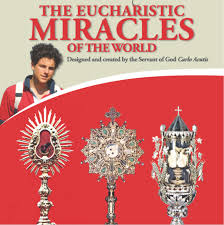
Like the Mystery of the Most Holy Trinity that is beyond human comprehension, the Holy Eucharist too is an ineffable Sacrament. However, in his apostolic exhortation Sacramentum Caritatis (Sacrament of Charity), Pope Benedict XVI, with reference to the presentation of the gifts, speaks of the relationship between the Eucharist and daily life: ‘In the bread and wine that we bring to the altar, all creation is taken up by Christ the Redeemer, to be transformed and presented to the Father. In this way we also bring to the altar all the pain and suffering of the world, in the certainty that everything has value in God’s eyes’ (No. 47).
Truly, just as God liberated the Israelites of old from the physical bondage of Egypt, Jesus liberates us from the bondage of sin and death.
-o-o-o-o-
[1] The Passover meal was divided fourfold: first, a dish of herbs was served and a festival blessing spoken over the first cup of wine; second, a recital of the Passover narrative and the Little Hallel (Psalm 113) and drinking of the second cup; the third was the main course (lamb and unleavened bread), after which was drunk the third cup of wine, called the “cup of blessing”; finally, there was the singing of the Great Hallel (Psalms 114-118) and the drinking of the fourth cup of wine. It is said that Jesus drank the third one only. Then he said, ‘I shall not drink again of the fruit of the vine until that day when I drink it anew in the kingdom of God.’ Accordingly, he refused the sour wine while on the Cross.
[2] Four Eucharistic miracles of the twenty-first century have been approved: Chirattakonam, India (2001); Tixtla, Mexico (2006), Sokolka, Poland (2008) and Legnica, Poland (2013).
[3] https://catholiclifeconference.org/blessed-carlo-acutis
[4] http://www.miracolieucaristici.org/en/liste/list.html
Holy Trinity and our Humility
Sunday after Pentecost is the Solemnity of the Most Holy Trinity. The Church has so designated this Sunday, even though the Father, Son, and Holy Spirit are invoked at Mass every single day, to ensure that this Mystery that is central to our faith and life is never taken for granted. No human so far has fully grasped this most intensely debated dogma, and never will; yet it befits us to humbly seek to understand it.
Perhaps the most common preliminary question pertains to how someone can be three and three be one all at once! It is a divine Mystery, which we believe in on the authority of the Scriptures; we cannot, for sure, rely on our limited comprehension.
In the Old Testament there is a hint of plurality in the ‘Let us…’ uttered at Gen. 1: 26. Later, in Gen 18, when three persons visit Abraham and Sarah, God the Father is said to have best engaged with the couple. He deigned to visit them, for the duo were soon going to be key figures in salvation history.
Further in the Old Testament, God, speaking to Moses in today’s First Reading (Deut. 4: 32-34, 39-40), reveals Himself as the Creator. For his part, the Prophet reminds his people that God from on high stretches out His arm in love, like no one else does or can. And what do we do? Alas, we hold back ours.... No science or doctrine comes in the way of our relationship with God, except our pride and ingratitude! No wonder, covenant after covenant failed and humankind eventually turned unworthy of the Father’s voice.
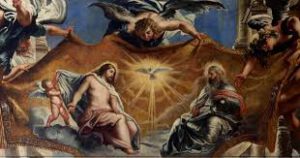
But still, God persevered. He did not reveal Himself directly to us all right, but by His infinite love He sent us His Only Son. Thus, God the Son, Jesus, born of Mary, lived and died as humans do, in everything but sin. Jesus revealed His divine origin to those who had eyes to see and ears to hear. He exhorted them to be like little children, simple and humble, to whom He reveals the mysteries of the Kingdom. 'Truly, I say to you, unless you turn and become like children, you will never enter the kingdom of heaven.' (Mt. 18:3).
God has so favoured us that we ought to gratefully honour his words. As St Paul says in the Second Reading (Rom 8: 14-17), ‘You have received the spirit of sonship, whereby we cry, Abba! Father!’ And needless to say, His Resurrection and Ascension became two undeniable proofs of His divinity.
To complete the picture, we got to know about the Holy Spirit at Pentecost. Today’s Gospel text (Mt 28: 16-20) reminds that, before Jesus ascended to Heaven, He commanded the apostles to go forth and baptise ‘in the name of the Father and of the Son and of the Holy Spirit.’ He instructed them not to leave Jerusalem until they had received the Holy Spirit which the Father would send them. Ten days later, the Holy Spirit indeed descended upon the Apostles and the Mother of Jesus gathered in the Cenacle.
What else does it take to believe in the Most Holy Trinity? It is incredible that despite being blessed with so many momentous happenings, let alone eloquent teachings, there are people who hold on to their prejudices. In fact, this Mystery mixed with a good dose of virtue should cause us to yearn for God. The gift of supernatural love can indeed quench that thirst, for God is love, and our Trinitarian God a divine family of love, a model for human households: members many, yet a close-knit family!
On this magnificent Solemnity of the Most Holy Trinity, let us first thank God very especially for the Revelation, for without it we would still be groping; let us next be grateful for the doctrine of the Church, her Fathers and Doctors; and finally, notwithstanding our limited human knowledge and reasoning, let us continually pray for ever-fresh insights into the undeniable reality of the Most Holy Trinity. It requires an essential degree of faith, purity and humility.
Also see: https://www.oscardenoronha.com/2023/06/04/the-holy-trinity-a-deep-mystery/
